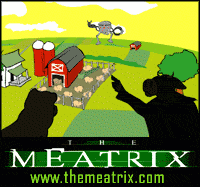
|
| Home | Reading Room | Newsletter | Reminders | Technique | Nursery |
| News | Sustainable Gardening | Trees & Shrubs | Flowers | Composting | Soil |
| Shopping | Tools | Books | How To's | Practical Advice | Children | IPM |
Home
Yard Waste RecyclingReducing the amount of solid waste entering landfills is an important reason to recycle yard wastes at home. Your efforts benefit the entire community, and they ultimately benefit your landscape.Studies indicate that lawns stay green and grow vigorously when grass clippings remain on the lawn. Research has shown that clippings do not contribute to thatch buildup as thatch is produced from the fibrous portions of grass plants, including the stems and roots, but not the grass blade. Don't let your grass get too long between mowings. For the best balance between top and root growth, never remove more than one-third of the leaf in any one mowing. If you miss a mowing and the grass surface becomes covered with heavy clippings, bag or rake up the clippings that time and compost them. For best results, use a mower designed to cut grass blades into fine pieces, allowing you to leave clippings on the lawn. By using a mulching mower, you can have a clean lawn that looks similar to one mowed with a bagging mower. Clippings decompose quickly becoming water-absorbent humus. They can generate up to 25 percent of your lawn's total fertilizer needs each year. You'll save money by buying less fertilizer. You also gain time for other activities because you won't have to stop every few minutes to empty your mower bag. Grass clippings left on lawns conserve water because they protect the soil from the hot sun and reduce evaporation. Homeowners in a Texas study cut their average mowing times by 38 percent when they didn't bag which balanced the time required to mow more frequently. Take care not to overfertilize lawn grass. Fertilize so the lawn grows at a reasonable rate. Fertilize at the proper time of year. Cool-season grasses should be fertilized in the fall of the year. For slow and even growth, use a fertilizer containing a slow-release nitrogen source, such as sulfur-coated urea, urea formaldehyde, or any other slow-release or slowly soluble nitrogen material. Thatch formation can become a problem if homeowners apply too much fertilizer or over water their lawns causing excess growth. In the spring, you may want to consider renting an aerator to remove cores of soil from the lawn. Aerating opens up the soil and permits greater movement of water, fertilizer, and air; increases the speed of decomposition of grass clippings; and enhances deep root growth. This autumn, plan to recycle leaves instead of raking and bagging them and putting them by the curb to be removed with the trash. Where there is only a light layer of leaves, you can shred the leaves with your lawnmower and leave them on the lawn to decompose. Like lawn clippings, decomposed leaves form water-holding humus and add nutrients to the lawn reducing fertilizer and water needs. When grass clipping or leaves become heavy enough to warrant removal from the lawn, compose them instead of sending them to the landfill. VCES publication 426-325 tells how to create a home compost bin. Beside reducing solid waste, the compost or "gardener's gold" you make will benefit your landscape plants.
|
| Reading Room | Trees and Shrubs | Flowers | Composting | Soil | Nursery |
| Shopping | Books | Tools | News | Internet Gardening | Links | Support |
| Vermicomposting | Pest Management | How To's | Practical Advice | Children |
| Home | Newsletter | About Us | Support | Contact |
|
GardenSimply.com | All Rights Reserved 2005 |
|
FREE
Garden Journal!! Join "Garden Notes" and plan for Harvest
Success as you track and record your gardening progress. Your Free Personal
Garden Journal includes printable pages making it easy for you to:
|
|
|
|
|
|
|
|
|
|

|
|
|
|



